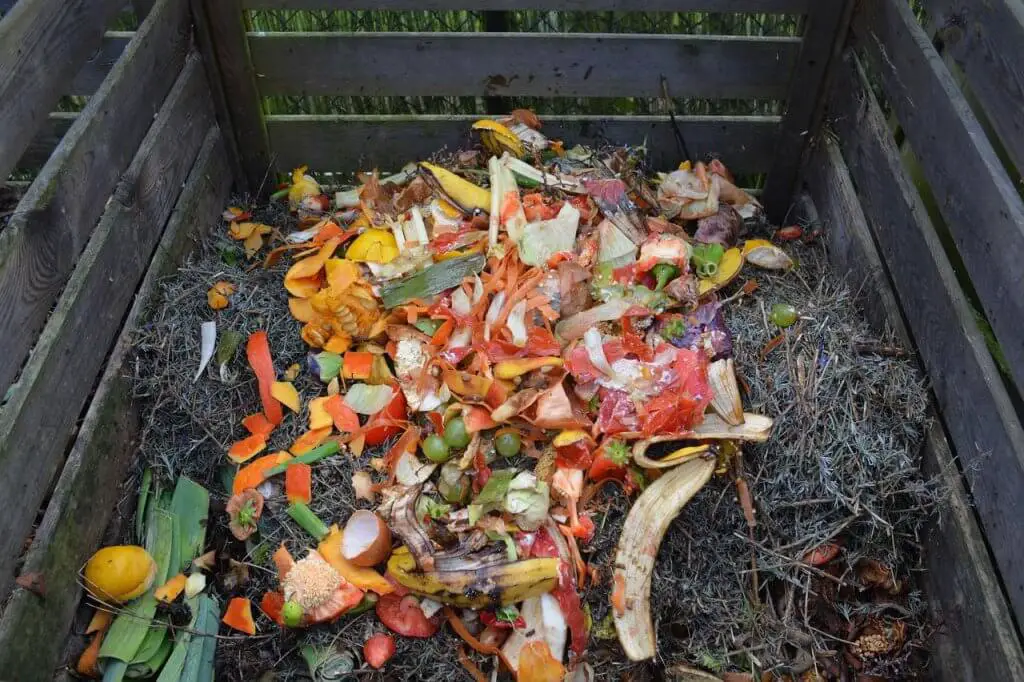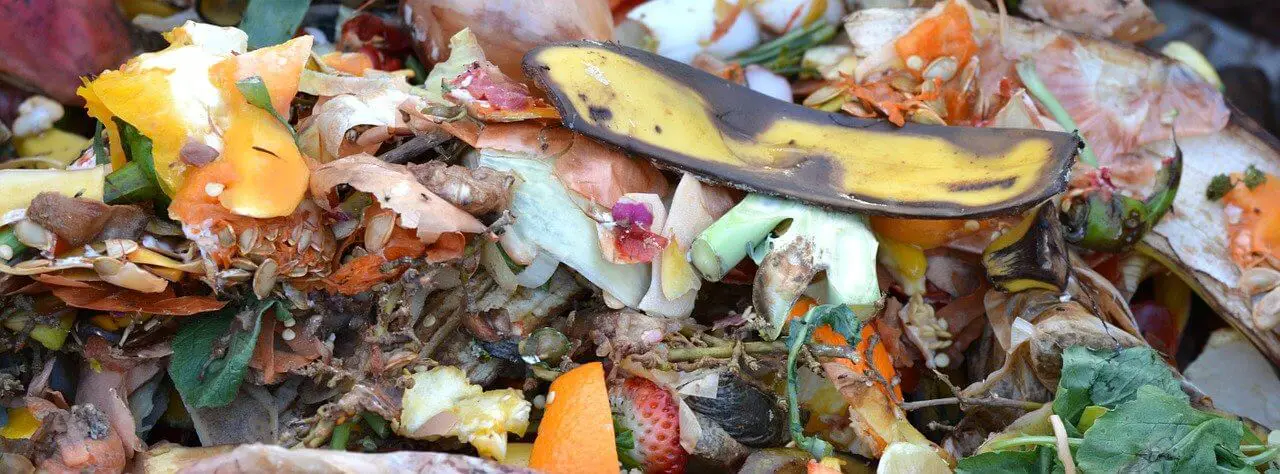Table of Contents
Does Compost Smell?
A healthy compost pile smells like dirt or dry leaves because of the organic matter used inside, like food waste and plant matter. Your compost heap is probably unhealthy if it emits a pungent smell, and the problem could be due to an improper composting routine.
Many people often assume that decomposing organic material will smell bad during composting. Yet, this shouldn‘t be the case.
If your compost has an off-putting smell, you must deal with it immediately.
While you can‘t get sick from a smelly compost pile, continued exposure to the foul smell may increase your risk of falling ill.
What Should Good Compost Smell Like?
A properly balanced compost heap should smell like dirt and aged plant matter.
This smell comes from the proper heating and breakdown of organic matter in your bin, including kitchen scraps, peels, and green matter from your garden.
A foul smell could indicate that the heap isn‘t receiving enough oxygen, among other reasons.
Are Compost Bins Stinky?
Compost bins give off a distinctive smell or odor that’s bearable even to a first-time composter.
The food scraps and peels used in these containers cannot produce the stinky smell found in your trash.
The only exception to a smelly compost is using manure in your compost pile because poop will produce hydrogen sulfide as it decomposes.
Nevertheless, you can always cover your compost pile with about 9 inches of brown material like dry leaves to reduce the smell of composting poop.
Hence, if you cannot bear the smell of your compost bin, something could be off-balance and requires immediate attention.
Why Is My Compost Smelling Bad: 10 Common Reasons
A smelly compost is a clear sign that something in your heap is off-balance.
Here are the 10 most common reasons why your compost may be smelling bad:
1. Your Compost Is Compacted
A tightly squeezed compost offers less room for aeration, creating a shortage of oxygen.
Without enough oxygen, the aerobic bacteria responsible for breaking down your compost into fertilizer is strained, cutting short the composting process.
Similarly, once the aerobic bacteria are suffocated, anaerobic bacteria are introduced into the compost causing a foul smell from their metabolic process.
The result is a compost pile that smells like rotten eggs.
You can use a pitchfork to regularly turn your compost heap and ensure it gets enough oxygen.
2. Too Much Green Material In Your Compost
While you can‘t have too many vegetables in your meals, compost heaps can‘t handle too much green matter. Common green matter includes vegetable scraps, fresh leaves, and grass clippings.
Too many greens release excess nitrogen into your compost, producing an ammonia-like smell.
You must balance green materials (nitrogen-rich sources) and brown materials (carbon-rich sources) to get the perfect compost.
3. Poor Layering
Sometimes your compost pile might have the perfect balance of green and brown material but still smells bad.
The problem could be your layering technique.
Some suggest placing the green waste above the brown in your layering until you end with a brown section at the top. Still, over-layering can also be a problem.
Other composters advise against isolating the green from the brown material lest the layers decompose incorrectly.
4. Excess Moisture
It‘s essential to have damp compost but not a wet one. Too much moisture compacts your compost pile and reduces any room for aeration.
This issue results in the suffocation of microbes essential to decomposing your compost, and the by-product has an unbearable smell.
You can try adding dry brown material, mainly sawdust, to help absorb excess moisture and give the microorganisms a conducive environment.
5. Pests In Your Compost
Compost makes the perfect habitat and attractive food source for various pests like rodents.
These pests and other wild animals tend to leave their droppings behind or perish inside, which could potentially cause a bad smell, especially in unenclosed compost piles.
You can use a compost bin or tumbler to help keep these pests out.
6. Food Scraps
Food scraps, especially cooked food, contain fats and oils that attract pests and cause strong odors in your compost.
While kitchen waste is an important nitrogen source, it‘s best to use only fruits and vegetable wastes for your compost.
If you must use food scraps, bury them deep into your compost pile and cover using brown materials.
7. Unsuitable Materials
Animal products are commonly unsuitable for your compost because they cause odors and attract pests to the heap.
8. You Don’t Turn Your Compost Pile
Yes! If you ignore your compost pile and never take the time to turn it, it will start smelling bad.
Turning your heap creates air holes for oxygen to circulate through the compost and activate aerobic bacteria.
Without enough oxygen, anaerobic bacteria will flourish, creating a foul smell.
9. Lack of Enough Microorganisms
While this phenomenon is rare, it occurs when there aren’t enough microorganisms to break down the raw materials in your compost pile completely.
The underlying reasons for such a shortage of bacteria vary but are most common in cases where composting is done in a tumbler.
10. Too Little Green Material In Your Compost
Aerobic bacteria in your compost require enough nitrogen to break down the compost.
When the green material is in short supply, the microbes won‘t function properly, introducing anaerobic bacteria that can cause bad smells in your compost heap.

My Compost Smells Like Poop. What Does It Mean?
A poop-like smell from your compost indicates that you have too much green material in your pile.
The excess green waste includes nitrogen-rich materials that commonly comprise wet food scraps, peels, and other garden types of kitchen waste or green matter.
When the green waste overloads your pile, it gives excess nitrogen that contributes to the bad smell.
Likewise, your compost pile could also have excess moisture, and the solution to both problems involves adding dry brown material to your heap.
Including dry leaves gives your wet compost heap a good balance of green and brown material and neutralizes the lousy poop odor.
What Does It Mean if My Compost Smells Like Ammonia?
Ammonia smells like rotten eggs, so if your compost bin has a similar smell, it could signify excess nitrogen from too much green matter in your heap.
Your compost pile could also be too wet, thus, creating the perfect conditions for anaerobic decay.
The best way to fix this issue is to add more carbon-rich materials, like sawdust or wood chips to give your heap the right balance.
The bacteria used in composting consume more carbon than nitrogen in a ratio of 30:1.
It would be best if you also turned your pile regularly to increase the airflow inside because the microbes involved in composting are aerobic microorganisms that need enough oxygen.
What If My Compost Pile Smells Sweet?
While it isn‘t common, your compost pile can smell sweet.
Though, this doesn’t mean that your compost is healthy but rather unhealthy.
Compost is supposed to have an earthy smell, and a sweet scent could signify inadequate oxygen in a heap.
This phenomenon is widespread if you have too many grass clippings in your compost bin.
The sweet smell is a by-product of decaying grass clippings which produce organic acids.
The aerobic bacteria are stimulated by the acid and use up all the oxygen fast, leaving no room for proper decomposition.
How Do I Stop My Compost From Smelling: 6 Quick Fixes
There are a few ways you can stop your compost from smelling bad, including:
- Mix a good ratio of green and brown material in your compost pile to keep it from becoming too wet or compact.
- Use small pieces of raw materials for your compost heap to help them break down faster.
- Turn your compost heap once every week or two for better aeration.
- Avoid adding animal products to your compost like meat, milk, and egg shells.
- Get yourself an efficient compost bin when composting inside the home, like the Bokashi bin you can get off Amazon.
- Wet your compost whenever it gets too dry.
Can I Add Twigs, Sticks, and Branches to My Compost Pile?
You can add twigs, sticks, and branches to your compost. When placed at the bottom, these items help create air pockets in your compost, giving your pile enough aeration for better decomposition.
Yet, do not add too many of these large items because while they will still rot down, they take a lot of time and make it difficult to turn your compost heap.
Can I Add Animal Products to My Compost Pile?
Yes and No.
While you can add animal products to your compost pile, you should avoid doing so.
These animal products include:
It might seem weird, but some people go as far as adding heavy cream or even cheese to their compost heap with the hopes of getting better compost.
Animal products will decompose. Yet, they carry loads of bacteria like E. coli and salmonella, which threaten public health.
Meat also attracts animals and insects to your compost pile, some of which are pests and rodents that cause harm to your home and plants.
If you must compost animal products, do so away from home and in an enclosed chamber like a compost tumbler.
What Are the Right Green materials to Add to Your Compost Bin?
Green materials are the ingredients in your compost heap with high nitrogen levels.
Still, they aren’t necessarily green in color and include:
- Grass clippings
- Food scraps
- Peels
- Weeds
- Coffee grounds
- Tea bags
- Fresh leaves
What Are the Right Brown Materials for Your Compost Pile?
A healthy compost pile needs the right balance of green and brown material.
Some of these brown materials include:
- Dry leaves
- Dry grass
- Newspaper
- Hay
- Straw
- Wood chips
- Sawdust
- Pine needles
- Twigs
- Dead plant clippings

